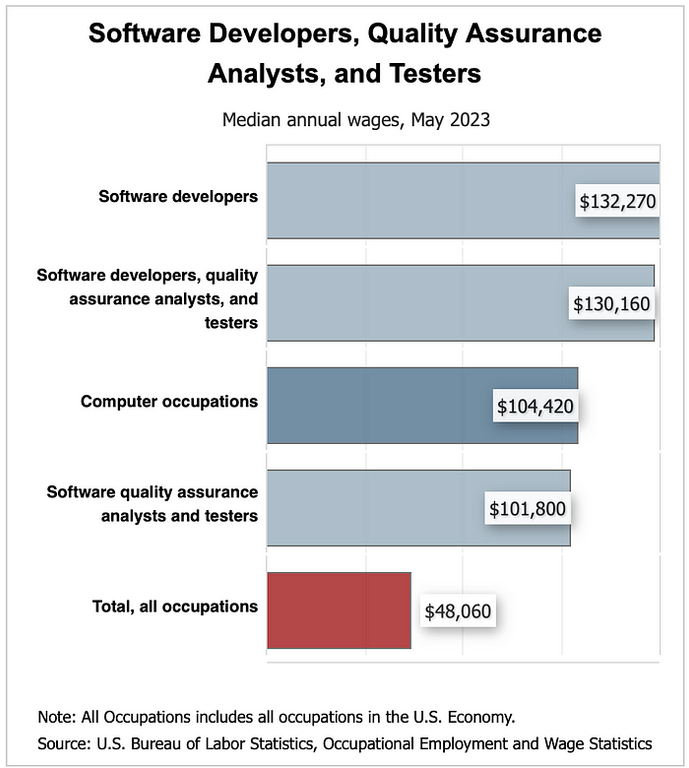
Tech talent has long been a coveted asset in the professional world, with software developers commanding a median salary of $132,270 in the spring of 2023—a number that impresses from any angle. Yet as we edge closer to 2024, the question looms: is it the opportune moment for burgeoning developers to embark on the whirlwind six-week journey to programming proficiency? Maybe not, and here’s why I believe entering software engineering in 2025 could steer you off course.
The Sobering Side of Software Development
Decoding Salary Realities
On paper, software developer salaries are enticing, almost dazzling.
Consider the median incomes for developers across the U.S.:

THE PANORAMA HOWEVER, is more complex than the surface suggests. A wave of layoffs throughout 2023 has intensified job competition and caused a noticeable decline in salaries, especially in places like Australia. Disturbingly, some devs have reported salary slashes as steep as 50% on discussion forums.
The AI Advancement Conundrum
Looking back to when AI started to revolutionize our field, circa 2022, it became evident that AI was reshaping the blueprint of coding jobs. We’re on the verge of a marketplace where developers transition into AI supervisors. The crunch is most dense for junior developers; as automated systems handle simpler coding tasks, entry-level roles become a rarity.
Without these opportunities, how will the future line-up of coders attain “production-readiness” and evolve into tomorrow’s expert developers? In many cases, instead of junior developers scrutinizing AI-generated code, we find non-tech professionals being nudged into these roles, with experienced developers cleaning up the aftermath. As this AI-driven transformation advances, the pathway for emerging coders tightens significantly.
Navigating the Rigors of Programming
Programming is a demanding pursuit often requiring a cocktail of intelligence, rigorous training, and unyielding perseverance. Ignore the hyperbolic promises of mastering Python overnight—competence demands years of education and effort.
The job market is unforgiving; securing a position doesn’t shield you from the relentless study for successive interviews. Maintaining a balance between full-time work and preparing for unforeseen opportunities is no easy feat, as many can attest.
The Challenges Persist
Even after overcoming initial hurdles, landing a job is just the beginning. Making a mark in a small software consultancy can be satisfying, yet it’s not FAANG-level glamorous. Be prepared to confront:
- Gruesomely long hours
- Unpaid overtime obligations
- Dysfunctional workplace dynamics
- Convoluted coding practices
- Subpar developer experiences
- Weak managerial support
- Inadequate benefits
- Limited professional growth
These barriers aren’t myths; junior developers often juggle these challenges in tandem with modest pay and scarce career advancement.
A Thought-Provoking Reflection
This analysis isn’t meant to deter you from chasing a career in software development. Rather, it’s a nudge to embark on this journey with profound reflection and awareness, avoiding the disillusionment that frequently accompanies our industry.
Indeed, programming is challenging. But for those truly driven by passion, it can be exceptionally fulfilling. Enthusiasm and ambition need to be your guiding beacons.






